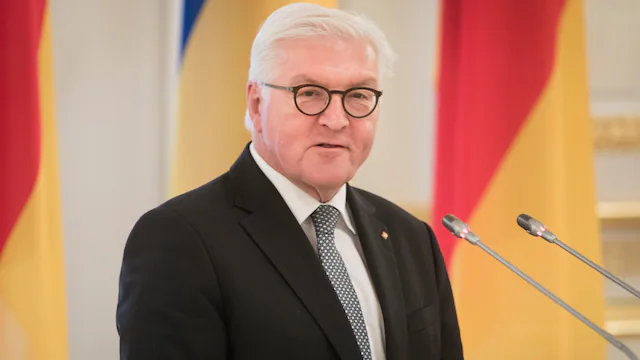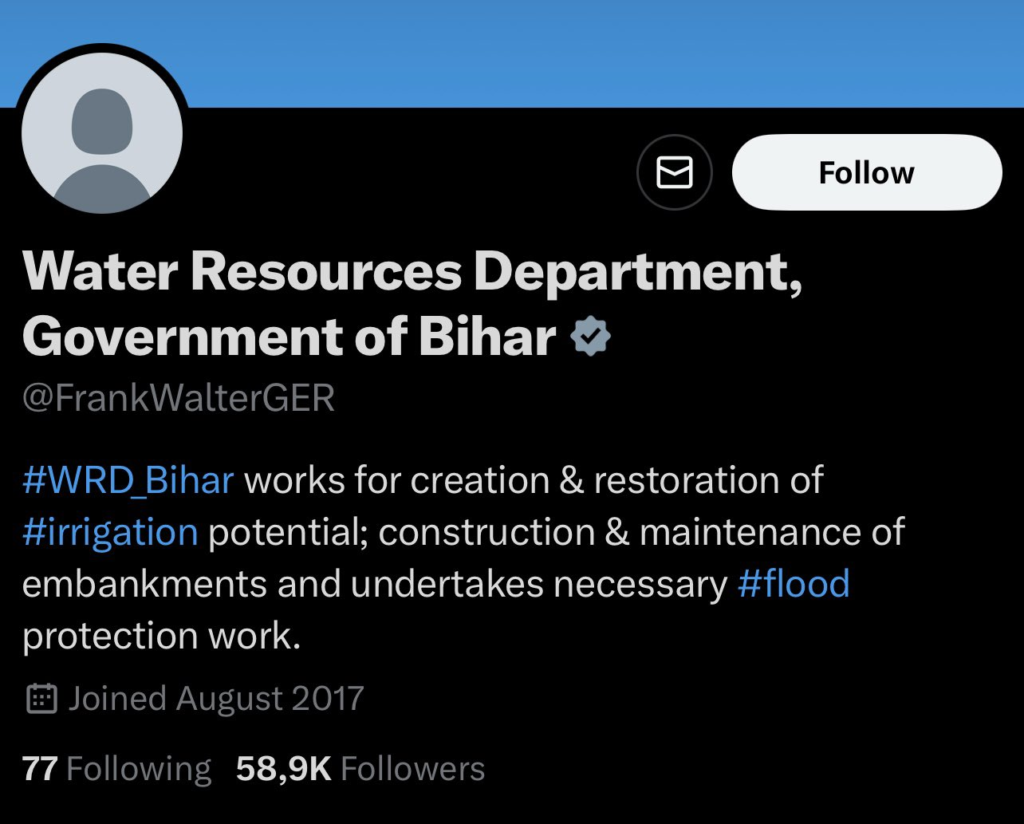The digital world was left stunned after the official X (formerly Twitter) account of German President Frank-Walter Steinmeier was reportedly hacked and transformed into the profile of the Bihar government’s Water Resources Department.
This unprecedented cyber breach not only raised serious questions about cybersecurity measures at the highest levels but also left social media users baffled by the hackers’ unusual approach.
While no official response has yet come from the German government, the incident has sparked a global conversation about online security, cyber warfare, and digital impersonation.
A Shocking Cyber Breach: How the Hack Unfolded
Social media users first noticed something was amiss when the username of the German President’s X account was abruptly changed to @adolf_gov. The handle’s description was modified to “Make Germany Great Again,” an apparent reference to former U.S. President Donald Trump’s well-known slogan, “Make America Great Again.”
This rebranding raised alarm bells, with users quickly suspecting malicious activity. The shock intensified when hackers posted an image of Adolf Hitler alongside Italian dictator Benito Mussolini, captioned: “Remember: when you stand together, when your goal is the same, when your spirit is unshakable, nothing can stop you. #MGGA.” The inclusion of the hashtag “#MGGA” further indicated the hackers’ intent to push a specific ideological narrative.
The attack gained widespread attention when the verified X account of BRICS News flagged it. They shared a screenshot of the German President’s account before it was compromised, proving that the hacked handle originally belonged to Frank-Walter Steinmeier. This revelation sparked an online frenzy, with users expressing disbelief over how such a high-profile account could be so easily infiltrated.
Read : Iran Supreme Leader Khamenei’s Hebrew X Account Suspended
Following the exposure of the hack, X briefly suspended the compromised account. However, in a bizarre twist, the account later reappeared with its name changed to the Water Resources Department of the Bihar government, while still maintaining the @FrankWalterGER handle.
Read : I Won’t Eat Omelette for a Week: Elon Musk After SpaceX Launch Destroys Nine Bird Nests
This strange alteration left many puzzled, as the switch from Nazi imagery to an Indian government department seemed entirely random. Some users speculated that the hackers aimed to create confusion and divert attention from their initial modifications.
Cybersecurity Crisis: What This Means for Digital Safety
This incident raises significant concerns about the state of cybersecurity, particularly for high-ranking officials. If the German President’s social media account can be hijacked so effortlessly, it highlights major vulnerabilities that cybercriminals could exploit for even more dangerous purposes.
Experts suggest that the hack could have been the result of a password breach, a phishing attack, or unauthorized access through compromised third-party applications. Given that world leaders’ social media accounts hold the potential to influence political discourse, spread disinformation, and even incite conflicts, this attack serves as a wake-up call for governments worldwide to enhance their digital security.

Cybercriminals often target prominent figures to spread propaganda, gain followers, or execute psychological operations. The hackers in this case not only embarrassed the German government but also managed to manipulate social media narratives.
The transition from a Nazi-themed account to a Bihar government department’s profile indicates that the perpetrators intended to create chaos rather than just push a particular agenda. The motive remains unclear, but such cyberattacks are becoming increasingly sophisticated and unpredictable.
Governments must prioritize robust cybersecurity frameworks to prevent such breaches. Two-factor authentication (2FA), advanced encryption, and regular security audits should be mandatory for accounts belonging to public figures.
Moreover, social media platforms like X must implement more stringent verification and monitoring mechanisms to detect and neutralize suspicious activities before they escalate.
Social Media Reactions and Global Implications
The German President’s X account hack quickly became a viral sensation, with users worldwide reacting with a mix of shock, humor, and concern. Memes flooded the internet, with some poking fun at the absurdity of the situation, while others highlighted the dangers of digital insecurity.
One user sarcastically wrote, “Imagine explaining to your grandkids that the German President’s account was turned into Bihar’s Water Resources Department overnight.” Another quipped, “Who knew cybercriminals had a sense of humor?” The bizarre nature of the hack made it a trending topic, with thousands of discussions on how such incidents could be prevented in the future.
Beyond the humor, the hack has broader implications. It serves as a stark reminder that cyber warfare is evolving, with hackers employing unconventional methods to disrupt governance and social order.
It also raises concerns for other world leaders and prominent figures who might be the next targets of such attacks. The increasing frequency of cyberattacks on government officials and institutions suggests that global cybersecurity protocols need urgent reinforcement.

Furthermore, the hack puts India’s Bihar government in an unintended spotlight. While there is no indication that the Bihar administration had any involvement, the fact that hackers chose to impersonate an Indian government department adds another layer of mystery to the incident. Was this a random selection, or was there a deeper intention behind it? The answer remains unclear, but it certainly raises eyebrows.
The hacking of German President Frank-Walter Steinmeier’s X account and its transformation into Bihar’s Water Resources Department profile is one of the most bizarre cyber incidents in recent history. While it may appear humorous on the surface, it underscores the pressing need for stringent cybersecurity measures for public figures and governmental institutions.
This breach demonstrates how easily hackers can manipulate digital identities and cause widespread confusion. It also highlights the responsibility of social media platforms in safeguarding high-profile accounts. As cyber threats continue to evolve, governments and individuals must adopt proactive security measures to mitigate the risks of such intrusions.
While the German government has yet to release an official statement, the incident serves as a warning for other nations to fortify their cyber defenses.
As the digital world becomes an integral part of political and social landscapes, ensuring security in cyberspace is no longer optional—it is imperative. The bizarre yet alarming events surrounding this hack will likely be analyzed for years to come, serving as a case study in the ever-growing battle between cybersecurity and cybercrime.

